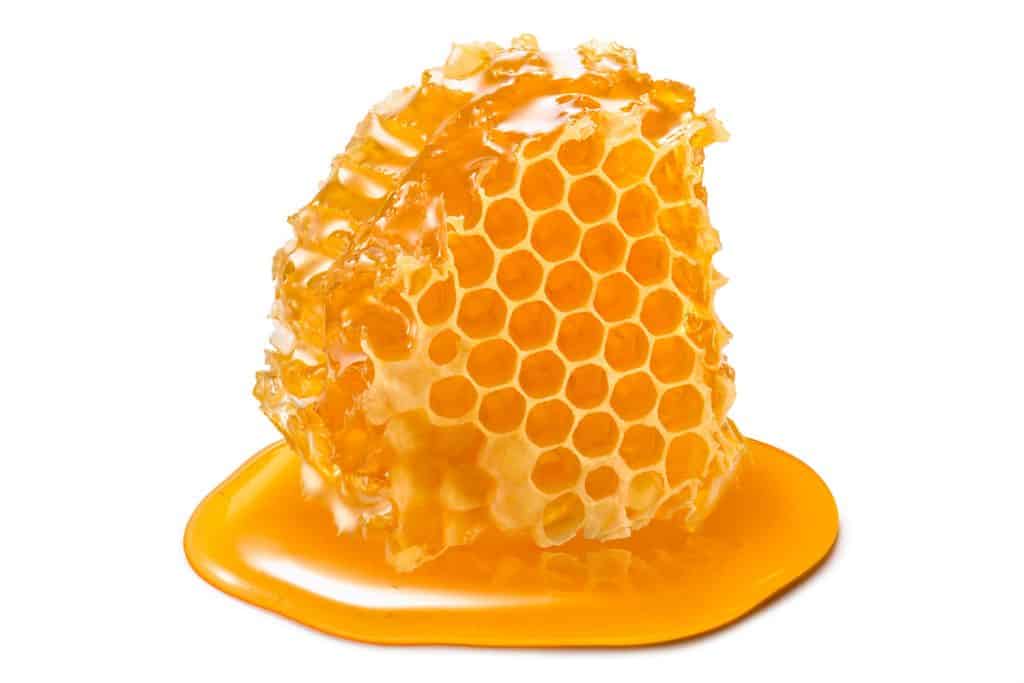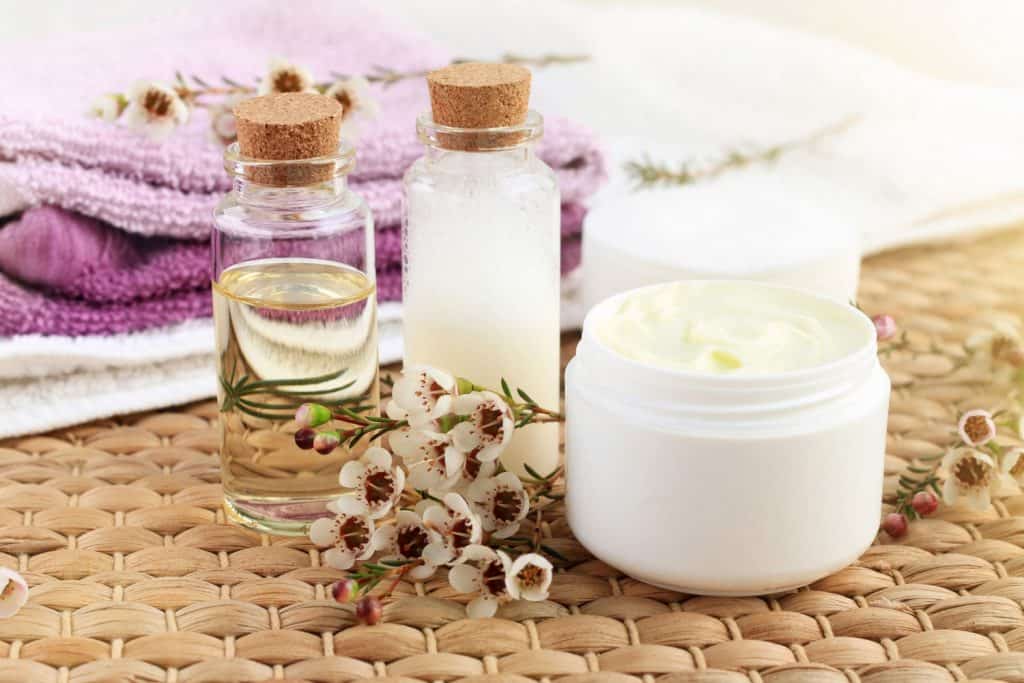- Coconut oil
- Shea butter
- Aloe vera gel
- Hydrating toner
- Hyaluronic acid serum
- Emulsions
- Sunscreen
- Exfoliant
Keep reading to learn more about each of these options. We'll cover when and how to use them. You'll also learn what kind of skin they're best for. We'll also cover a few things that you should never put on your face. Finally, we'll cover homemade moisturizers and which option is the most effective.
![Little apothecary glass vials with aroma essential oil in wooden box, 8 Great Moisturizer Alternatives [And Some That You Shouldn't Use]](https://stylecheer.com/wp-content/uploads/2021/04/8-Great-Moisturizer-Alternatives-And-Some-That-You-Shouldnt-Use-683x1024.png)
This article may include affiliate links and elements that were carefully created by our team using advanced ai to help you envision the best style advice.
Moisturizer Alternatives
1. Coconut Oil
Coconut oil is a popular pick because it's cheap and easy to use. It's actually a sealant. This means it works to trap moisture within the skin. Because of this, it's best used when the skin is already damp, like after the shower. Coconut oil won't work by itself without that extra moisture.
There are anti-inflammatory properties in coconut oil. This makes it beneficial for those with conditions like eczema and dermatitis. Of course, always follow the advice of a medical professional. But many long-term sufferers of these conditions do find coconut oil to be helpful. It also contains a variety of fatty acids, which can help keep skin looking healthy.
If you're prone to allergies, avoid selecting one with additives. Ideally, find an organic, nonhydrogenated extract. These will be of higher quality. This is safe to use on skin or hair without irritation, though overuse can clog pores. Dry skin takes it well, but oily complexions don't always.
And one final safety note. If you've heard coconut oil can replace sunscreen, it's false. Coconut oil does have some natural SPF, but it only rates about an 8. This is extremely low and doesn't provide enough protection to cut out the sunscreen altogether.
Click here to see this coconut oil on Amazon.
2. Shea Butter
A creamy cosmetic blend, shea butter can soothe, tone, and condition the skin. It has anti-inflammatory and anti-aging properties. The butter is also an emollient, which helps lock moisture into your skin. It also seems to increase or encourage collagen production, resulting in younger, healthier-looking skin.
The downside to shea butter is that it can be clogging for pores. If your skin is oily and prone to breakouts, this may not be the right match for you. Even if you don't struggle with acne, you're probably better with a blend than pure shea butter. Consider a cream that blends shea butter with other ingredients, or consider making a mask.
Click here to see this shea body butter on Amazon.
3. Aloe Vera Gel
If you're oily skinned by nature, then aloe vera gel is the one to try. It absorbs into the skin quickly and easily. This means it doesn't sit on the skin's surface long enough to clog pores. But it also locks in moisture, perfect for damp skin after the shower. Aloe vera gel can also be soothing for inflammation, such as breakouts, dermatitis, or psoriasis.
Click here to see this aloe vera gel on Amazon.
4. Hydrating Toner
Most people, when thinking of toners, picture the alcohol-based mixtures of products like Sea Breeze. Toners are for acne-prone teens. Picture the scene, sweeping a pore-opening cotton ball across their skin that tightens their face and stings their eyes.
But, in actuality, toners can work toward any number of beauty goals. Some exfoliate acne-prone skin; some moisturize, some even blend anti-aging compounds to keep skin youthful. If you have a specific skin concern to address, a toner is a perfect way to make sure it gets a daily spot in your beauty routine.
Dry skin can be soothed with hydrating toners, such as this one:
Click here to see this Hydrafresh Toner on Amazon.
5. Hyaluronic Acid Serum
Hyaluronic acid is naturally present in the skin. It keeps the skin plump, supple, and hydrated. However, over time, other environmental factors and stressors deplete our natural levels. Using a hyaluronic acid serum can restore these levels and help retain your naturally moist skin.
You can also consider serums that blend multiple ingredients. This way, you can target specific concerns. Hyaluronic acid's hydration can be combined with retinol for fixing damaged skin, collagen for smoothing wrinkles, or vitamin C to brighten the complexion. Find a blend that works best for your needs.
Click here to see this serum on Amazon.
6. Emulsions
Thick, hydrating lotions tend to feel creamy and sometimes even greasy or oily. If you like the idea of lotion, but want something light and watery, try an emulsion. These are water-based and light, a chance to moisturize without having your skin weighed down. If you're afraid to be overwhelmed and weighed down as products pile on, this is your answer.
Much like toners or serums, there's a wide variety of options. This is a perfect time to address specific concerns and find the right product for you. Emulsions are designed to combat redness and irritation, dry skin, acne-prone skin, or anything in between. If you're mostly looking for moisture, pick one with hyaluronic acid.
For best results, be sure to use it right. An emulsion goes on at the end of your cleaning and beauty routine. The only step after the emulsion is sunscreen.
Click here to see this emulsion on Amazon.
7. Sunscreen
Sunscreen with enough moisturizing ingredients can be used in place of moisturizer. If you have normal skin that doesn't need moisturizing, save a step by picking a sunscreen that does two jobs.
You'll want to look for keywords like ceramides, emollients, and humectants. These all work together to keep the skin lubricated. For more information, see Can Sunscreen Replace Moisturizer? [And Vice Versa].
Click here to see this moisturizing sunscreen on Amazon.
8. Exfoliant
If your skin feels dry and dull, you may need an exfoliant. The thing about lotions and moisturizers is that they hydrate temporarily. This plumps up the skin - even dull, dead skin - making you feel refreshed. As a result, the problem seems to be fixed - for now.
But as the lotion wears off, the dead skin is still there. It is duller than ever, making you believe that you need more moisturizer. The long-term fix is actually to exfoliate regularly. Remove that layer of dead skin, and reveal the healthy, glowing skin underneath. For some ideas, see 5 Great Body Scrub Alternatives To Try Out.
Moisturizers To Avoid
Conversely, there are a few things that old wives' tales have led people to believe should be used on their skin. But they don't! Some examples of things you should never put on your face include:
- Hydrogen peroxide - this kills bacteria, making it useful against acne. But it also damages your skin, making it hard to grow replacement tissue or heal an injury.
- Breast milk - no matter what ails you, somewhere, there's someone that swears that it can be cured by breast milk. In the case of your face, however, breast milk benefits are found chiefly in lauric acid. This fatty ingredient occurs in plenty of other face products. You don't need to resort to smearing breast milk around. You can instead settle for a simple serum that's designed to be more effective.
- Witch hazel - it's a natural astringent that some swear by. But it does strip your face of natural oils. As a result, it can encourage your skin to increase sebum production. Much like over-moisturizing, this one tends to do more harm than good.
- Honey - there are antibacterial and anti-inflammatory properties in honey. For this reason, it's a useful ingredient in some masks and beauty products. But on its own, studies show it isn't any more useful than antibacterial soap.

How Can You Hydrate Your Skin Without A Moisturizer?
Some people don't want moisturizers - or products that replace moisturizers. If you're more interested in replacing the need for extra beauty products altogether, here are some lifestyle changes that can help:
- Eat healthy fatty foods. Foods high in omega 3s like avocado, salmon, and olive oil are great for hydration. They make the skin more able to keep moisture inside.
- Sleep with a humidifier
- Avoid too-hot showers, which strip your skin of natural oils.
- Drink more water.
- Avoid alcohol, which dehydrates the body. This leaves skin blotchy and bloated.
How Do You Make Homemade Moisturizer?
You can blend some of the moisturizing ingredients suggested above for a homemade moisturizer. One popular recipe for dry skin is:
- 1/2 cup shea butter
- 2 tbsp coconut oil
- 2 tbsp almond (good for anti-aging), aloe vera (for oily skin), or jojoba (for dry/normal skin) oil.
Just mix and apply! If you'd like, you can also add a few drops of essential oils. Just be careful - not every essential oil is safe for use on the skin. Some recommendations are frankincense, geranium, tea tree, lavender, and rose.

What Is The Most Effective Type of Moisturizer?
If you've decided to stick with a more traditional moisturizer, you might be wondering what kind to use. After all, there are creams, lotions, and ointments. The one that works best for you depends on your skin type.
For itchy or dry skin, pick a thick, hydrating ointment. Water-based lotions, on the other hand, are a perfect choice for oily complexions. Creams are between the two and a good choice for normal skin. They offer production without being quite as suffocating.
In Closing
![Little apothecary glass vials with aroma essential oil in wooden box, 8 Great Moisturizer Alternatives [And Some That You Shouldn't Use]](https://stylecheer.com/wp-content/uploads/2021/04/Little-apothecary-glass-vials-with-aroma-essential-oil-in-wooden-box.jpg)
Moisturizers are a daily part of most people's routine, but they may be unnecessary. Many dermatologists believe that excessive use of moisturizers might actually do more harm than good. Irritation, premature aging, and further drying of the skin may occur.
Most of the time, healthy skin can maintain its own balance. Simple adjustments like lukewarm showers, healthy eating, drinking more water, and humidifiers can keep the skin lubricated. If the skin is really dry, better sources of moisture include coconut oil, shea butter, and aloe vera gel. Hydrating toners, serums, sunscreens, and emulsions can also provide a source of hydration. Finally, consider whether the skin feels dry because it is damaged and dead. In this case, exfoliants may be the most helpful solution.








![Scientist holding Cyanoacrylate glue, Is There An Eyelash Glue Without Cyanoacrylate? [A Guide to Finding Safe Alternatives] - 1600x900](https://stylecheer.com/wp-content/uploads/2023/09/shutterstock_2238414685-300x169.jpg)
![Applying lash glue onto fake eyelashes, Why Is My Lash Glue Not Sticking? [Common Reasons and Solutions] - 1600x900](https://stylecheer.com/wp-content/uploads/2023/09/shutterstock_1059533828-300x169.jpg)
![Pouring black lash glue onto a small mat, What Glue Do Lash Techs Use? [A Guide to Lash Extension Adhesives] - 1600x900](https://stylecheer.com/wp-content/uploads/2023/09/shutterstock_1541038103-300x169.jpg)
I started to get dry, patchy itchy spots around my lips when I switched from my regular moisturizer to aloe vera gel.